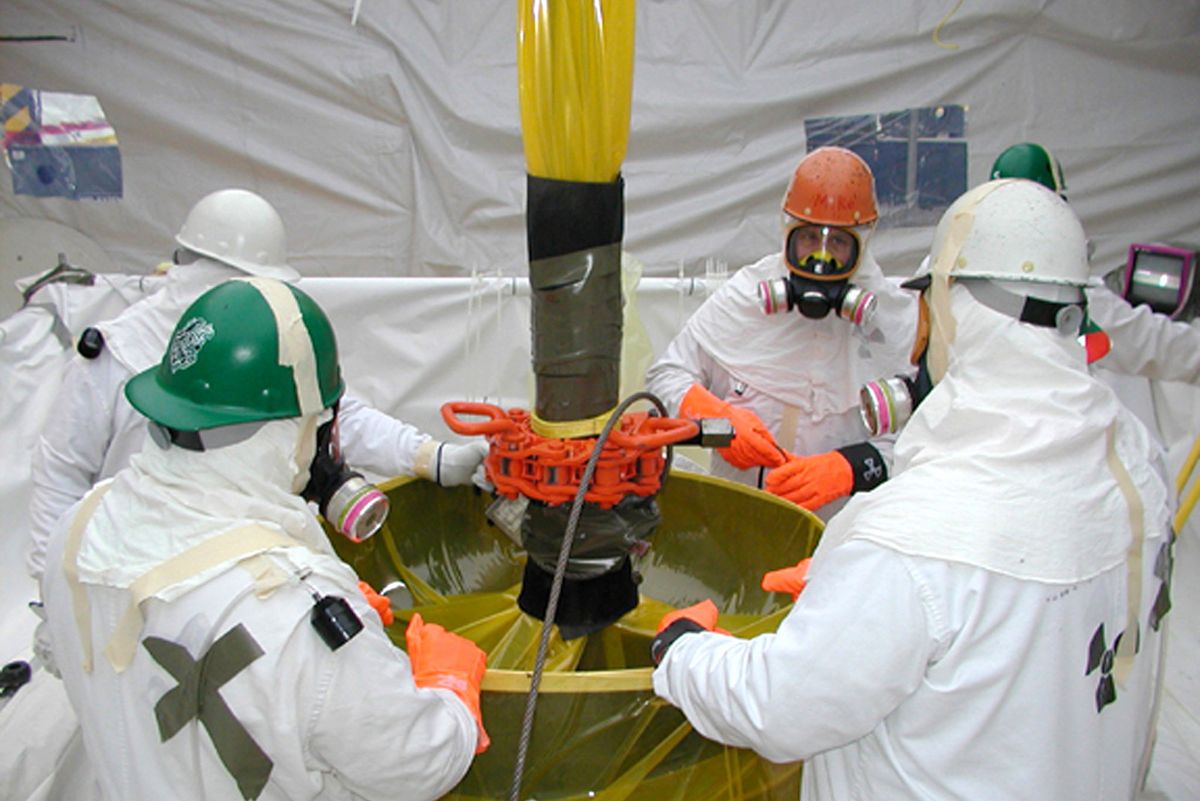Hanford cleanup faces changes, new challenges
New national leadership, old lawsuits among them

RICHLAND, Wash. – Each year, the federal government spends roughly $2 billion to rid the nation’s most contaminated nuclear site of toxic and radioactive waste.
Now, winds of change are blowing across southeast Washington’s Hanford Nuclear Reservation.
Three new contractors won bids to handle some of the work. A new president and new Congress assumed office with their own ideas about how taxpayers’ money should be spent. The state has filed suit, charging the federal government with failing to meet its legal obligations there.
The changes mark a period of transition for everyone involved with cleaning up the sprawling 586-square-mile site, from pumping and treating miles of contaminated groundwater to building a massive plant to convert radioactive waste into a stable glass for long-term disposal.
But transition can’t mean more long delays or a halt to the work, Gov. Chris Gregoire said in a telephone interview with the Associated Press.
“The costs are too great,” she said. “If we were to fail to clean up that site and contaminate the Columbia River, the costs would be way more than anything it would take us to clean up the site itself.”
The federal government created Hanford in the 1940s as part of the top-secret Manhattan Project to build the atomic bomb. Today, it is the nation’s most contaminated nuclear site, with cleanup costs expected to top $50 billion.
Workers made plenty of progress last year, often encountering unknown hazards that can slow work and endanger safety, but the challenges ahead are just as varied and massive.
Cleanup at the site is divided among five major contracts, three of which went out to bid last year.
Two of the companies that were awarded contracts – Washington River Protection Solutions will retrieve tank waste and work to close the tanks, while CH2M Hill Plateau Remediation Co. will clean up the site’s central plateau – just assumed control in October. A third contract to handle safety and security, information technology and road work, which was won by a group led by Lockheed Martin, is on hold while the Energy Department resolves issues raised in protest of the contract award.
Federal contracts that are awarded today are far superior – and more substantive – to contracts in the past, but the process still causes delays to work getting done, Gregoire said.
“I would prefer the contracts be longer than up for bid every five years,” she said. “In addition to being disruptive to the work, there’s clearly a degree of angst with the work force.”
Energy Department managers say the changeover of contractors can result in delays while workers review projects and safety measures. But they say new contractors also bring fresh enthusiasm and ideas to what can be technologically challenging work.
For instance, tank waste retrieval stopped while workers and new managers were trained, said Shirley Olinger, one of two Energy Department managers overseeing Hanford cleanup as head of the Office of River Protection.
“But typically, what we find is that we’re going to get a lot of innovative thinking,” she said. “I think with new contractors, you go through short-term challenges, but in the long run, DOE gets new approaches to the job.”
Even more challenging in recent months: finding the money to complete the work and meet legal deadlines for cleanup.
The Energy Department has said it will miss 23 deadlines this year because there is insufficient money in the 2009 budget. Now, some U.S. senators are pushing the Obama administration to spend stimulus money to clean up not just Hanford, but all Cold War-era sites.
“A lot of the progress here is riding on the amount of dollars that are allocated,” said Rod Lobos, a project manager for the Environmental Protection Agency. “The work force here is ready, willing and able to do the work. They just need to have those dollars there.”
Lobos conceded that some projects are constrained by technology – workers either aren’t yet sure how best to approach a project or technical problems have arisen during the cleanup.
But more are constrained by limited money, he said.
David Brockman, the Energy Department’s other manager overseeing Hanford cleanup from the Richland Operations Office, agreed some work could be accelerated with additional money. He cited work to pump and treat contaminated groundwater and efforts to retrieve highly radioactive waste from the site’s central plateau.
Work has been slowed in that area due to lack of money because it is farther from the Columbia River.
For her part, Gregoire believes that President Barack Obama and his new energy secretary, Nobel Prize-winning physicist Steven Chu, recognize the importance of cleaning up the site, despite other pressing energy issues.
“I want the Department of Energy to have a 21st century mission and change, but it has got to ensure that it maintains its responsibility for cleanup at Hanford as well as other sites around the country,” Gregoire said.
She’s also hopeful that Obama and his attorney general will work to resolve the state’s recent lawsuit.
In 1989, the state and federal government signed the Tri-Party Agreement to establish legal deadlines for completing all phases of the cleanup. Twenty years later, the two sides are embroiled in a lawsuit over missed deadlines and inadequate funding.
Gregoire said she won’t take anything away from the progress that’s been made under the agreement, even though she’s discouraged.
“I don’t think taxpayers should have to spend money to get the federal government to live up to its responsibilities,” she said. “Having said that, I think it would be derelict in our responsibility not to have brought the lawsuit.”
Through it all, work to clean up the toxic site continues regardless.
“We’re still implementing the TPA. We’re all committed to the cleanup. We’re cooking,” Brockman said. “People might get the impression that work is slowing down because there’s a lawsuit. That couldn’t be farther from the truth.”